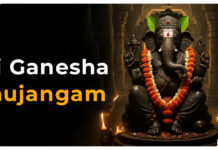
Can We Change Our Fate?
A Scriptural Perspective on Destiny and Devotion
It’s a question many of us ponder at some point in life:
“If Brahma has already written our fate, why do we worship?”
Is everything predestined? Or do we have the power to change our destiny?
What the Scriptures Say About Destiny
According to Hindu philosophy, Brahma, the creator, indeed writes the fate of every soul based on past karma. However, there’s a lesser-known and powerful truth recorded in our scriptures:
“Fate, once written, cannot be rewritten by Brahma himself — but it can be transformed through sincere upasana (spiritual practices) and archana (worship).”
This means that although destiny is shaped by karma, it is not set in stone. With the right spiritual effort, discipline, and devotion, one can realign their karmic path.
The Story of King Vibhumukha
In ancient times, a righteous king named Vibhumukhudu was fated to die at the age of 50, as written by Brahma himself. No human or celestial being was said to be able to stop this fate.
Yet, with the guidance of his Guru, Vibhumukhudu took refuge in devotional practices. He chanted sacred mantras, performed Mrityunjaya Homa, and dedicated himself to spiritual sadhana.
As a result, he survived beyond 50, proving that divine grace and tapasya can overcome even the most rigid destinies.
Duryodhana – A Lesson in Negative Karma
Contrast this with Duryodhana, who was destined to live for 128 years. However, his life ended at the age of just 60.
Why? Because of the heavy burden of adharma (unrighteousness) he carried — particularly the unforgivable act of allowing Draupadi to be insulted and humiliated in public.
Despite a long lifespan written in his fate, his actions destroyed his karmic protection.
This shows that even a favorable destiny can be cut short by negative karma.
How Can We Change Our Fate?
Our scriptures suggest many ways to purify karma and transform our lives:
-
Japa (Chanting the Lord’s Name)
Constant repetition of the Lord’s name creates divine vibrations that purify the mind and body. -
Dhyana (Meditation)
Brings clarity, balance, and alignment with higher consciousness. -
Dana (Charity and Service)
Selfless giving clears past karmas and builds spiritual merit. -
Archana, Homa & Vratas
Sacred rituals and austerities invoke divine blessings to dissolve karmic blocks.
“Nama Smarana” — remembering and repeating God’s name — is considered the simplest and most powerful of all these practices in Kali Yuga.
Yes, Brahma writes our fate but he also leaves a door open for us to rewrite our future through devotion, discipline, and good deeds. We are not powerless puppets under fate’s control.
Instead, we are conscious beings capable of influencing our destiny with faith, effort, and surrender.
So keep chanting. Keep praying. Keep giving.
And let the Divine rewrite your story.
Jaya Sri Mahadeva! Om Namah Shivaya!
Related Posts:










